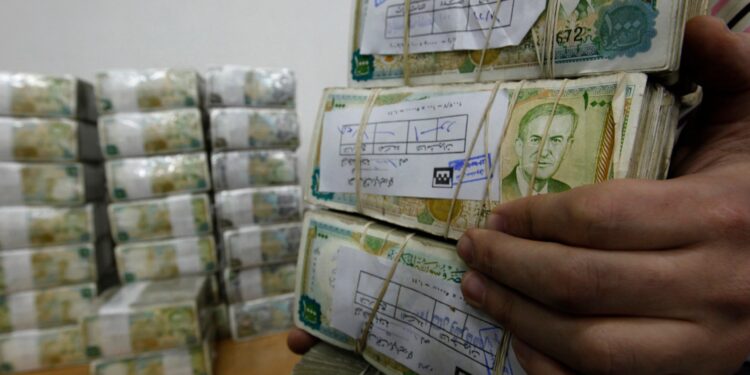The exchange rate of the Syrian pound against the dollar today, Tuesday, fell in the market transactions parallel to the Syrian cities, while the Central Bank of Syria continued to fix the price in official transactions.
The exchange rate of the Syrian pound against the dollar in the parallel market
- The exchange rate of the Syrian pound against the dollar in Damascus and Aleppo decreased to 10 thousand and 325 pounds from 10 thousand and 100 pounds upon purchase, and to 10 thousand and 475 pounds from 10 thousand and 250 pounds upon sale.
- The exchange rate of the lira in Idlib decreased to 10 thousand and 350 pounds from 10 thousand and 100 pounds upon purchase, and to 10 thousand and 500 pounds from 10 thousand and 250 pounds upon sale registered yesterday evening.
- In Hasaka, the Syrian currency decreased to 10 thousand and 500 pounds when purchasing from 10 thousand and 350 pounds registered yesterday evening, and decreased to 10 thousand and 600 pounds from 10 thousand and 450 pounds upon sale.
The exchange rate of the Syrian pound against the dollar in official transactions
The Central Bank of Syria continues to sell the exchange rate of the Syrian pound against the dollar in official transactions at 12 thousand when purchasing and 12 thousand and 120 pounds upon sale.
https://www.youtube.com/watch?v=Zze95d7izik
Factors affect the exchange rate of the Syrian pound
Internal policies
- The Central Bank of Syria reduced the exchange rate of the Syrian pound against the dollar to 12 thousand pounds when purchasing at the beginning of this week and continues to install this level.
- The Central Bank of Syria for banks and the licensed exchanges allowed the pricing of the lira for foreign currencies, which increases or decreases with a certain margin than the official price issued in the “Central” bulletins, which would compete with the parallel market.
- Syrian President Ahmed Al -Shara and the leader of what is known as the Syrian Democratic Forces (SDF) agreed to join the Syrian state, which contributes to stability in the northeast of the country.
- The number of employees in the country decreased after the demobilization of a large number of fictitious employees and the solution of the previous regime’s army and its police, two sides that have acquired during the past years the greater amount of government exchange.
External factors
- The European Union announced the continuation of studying the possibility of extending the suspension of sanctions imposed on Syria while closely monitoring the situation in the country, according to leaders last week.
- Canada has announced that it plans to reduce the sanctions imposed on Syria in the transitional period, and to provide new funding for humanitarian aid with 84 million Canadian dollars ($ 58.4 million).
- During March 24, Britain deleted a Syrian entity from the sanctions list, including the central bank, other banks and oil companies, and these entities are no longer subject to the freezing of assets.
- The United States temporarily lifted US sanctions on Syria, which opened the door for dealings with government institutions and energy transactions, and allowed the transfer of personal funds to the country, including the Central Bank of Syria.



